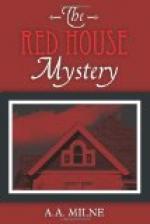“I wonder if he’s giving evidence too,” thought Antony. He was. He followed Amos. He had been at work on the lawn in front of the house, and had seen Robert Ablett arrive. He didn’t hear the shot—not to notice. He was a little hard of hearing. He had seen a gentleman arrive about five minutes after Mr. Robert.
“Can you see him in court now?” asked the Coroner. Parsons looked round slowly. Antony caught his eye and smiled.
“That’s him,” said Parsons, pointing.
Everybody looked at Antony.
“That was about five minutes afterwards?”
“About that, sir.”
“Did anybody come out of the house before this gentleman’s arrival?”
“No, sir. That is to say I didn’t see ’em.”
Stevens followed. She gave her evidence much as she had given it to the Inspector. Nothing new was brought out by her examination. Then came Elsie. As the reporters scribbled down what she had overheard, they added in brackets “Sensation” for the first time that afternoon.
“How soon after you had heard this did the shot come?” asked the Coroner.
“Almost at once, sir.”
“A minute?”
“I couldn’t really say, sir. It was so quick.”
“Were you still in the hall?”
“Oh, no, sir. I was just outside Mrs. Stevens’ room. The housekeeper, sir.”
“You didn’t think of going back to the hall to see what had happened?”
“Oh, no, sir. I just went in to Mrs. Stevens, and she said, ’Oh, what was that?’ frightened-like. And I said, ’That was in the house, Mrs. Stevens, that was.’ Just like something going off, it was.”
“Thank you,” said the Coroner.
There was another emotional disturbance in the room as Cayley went into the witness-box; not “Sensation” this time, but an eager and, as it seemed to Antony, sympathetic interest. Now they were getting to grips with the drama.
He gave his evidence carefully, unemotionally—the lies with the same slow deliberation as the truth. Antony watched him intently, wondering what it was about him which had this odd sort of attractiveness. For Antony, who knew that he was lying, and lying (as he believed) not for Mark’s sake but his own, yet could not help sharing some of that general sympathy with him.
“Was Mark ever in possession of a revolver?” asked the Coroner.
“Not to my knowledge. I think I should have known if he had been.”
“You were alone with him all that morning. Did he talk about this visit of Robert’s at all?”
“I didn’t see very much of him in the morning. I was at work in my room, and outside, and so on. We lunched together and he talked of it then a little.”
“In what terms?”
“Well—” he hesitated, and then went on. “I can’t think of a better word than ‘peevishly.’ Occasionally he said, ’What do you think he wants?’ or ‘Why couldn’t he have stayed where he was?’ or ’I don’t like the tone of his letter. Do you think he means trouble?’ He talked rather in that kind of way.”




